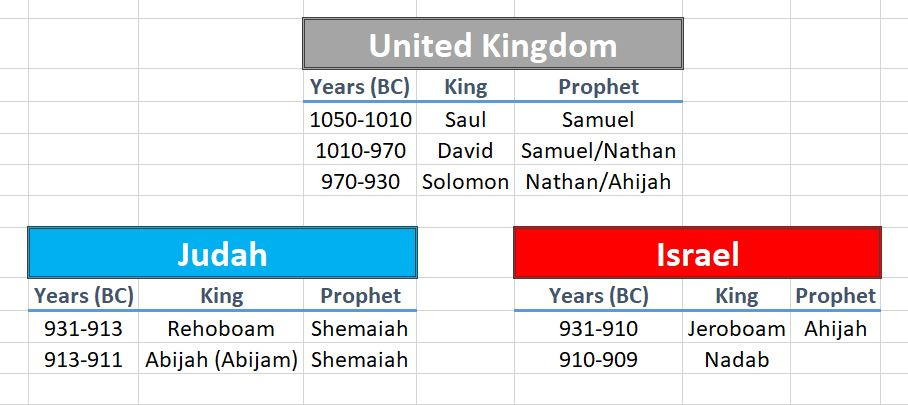Nadab is the first king of Israel we aren’t told much about. He won’t be the last, but he is the first.
After King Jeroboam died, Nadab, his son, came to the throne. But he didn’t remain on the throne for long.
The Overview of Nadab’s Reign.
While Nadab reigned for two years, we aren’t told anything about his accomplishments - although he did accomplish some things (1 Kings 15:31). God’s word reveals the only thing that mattered about Nadab’s reign.
Now Nadab the son of Jeroboam became king over Israel in the second year of Asa king of Judah, and he reigned over Israel two years. And he did evil in the sight of the LORD, and walked in the way of his father, and in his sin by which he had made Israel sin. (1 Kings 15:25-26)
The summary of Nadab’s reign is that he did evil in God’s sight, and followed the way of his father and the sin of idolatry which his father had made such a sin in Israel. Nadab made no effort to turn from his sin, or to do anything different from what his father had done.
As a result, his reign as king of Israel did not last long.
The Assassination of Nadab.
While laying siege to Gibbethon - a Philistine city - Nadab’s reign and life were cut short.
Then Baasha the son of Ahijah, of the house of Issachar, conspired against him. And Baasha killed him at Gibbethon, which belonged to the Philistines, while Nadab and all Israel laid siege to Gibbethon. Baasha killed him in the third year of Asa king of Judah, and reigned in his place. (1 Kings 15:27-28)
No doubt, Nadab had great plans to grow the strength of his kingdom - he’s going on the offensive against the Philistines. And it seems those plans were going well, they were laying siege to a Philistine city and eventually would have starved out the inhabitants and taken the city.
But all those plans were cut short when Nadab’s life was taken by Baasha.
The Word of the Lord Comes to Pass.
The Lord passed judgment on Jeroboam’s house because of his sin and stubborn refusal to repent.
Therefore behold! I will bring disaster on the house of Jeroboam, and will cut off from Jeroboam every male in Israel, bond and free; I will take away the remnant of the house of Jeroboam, as one takes away refuse until it is all gone. The dogs shall eat whoever belongs to Jeroboam and dies in the city, and the birds of the air shall eat whoever dies in the field; for the LORD has spoken! (1 Kings 14:10-11)
After Baasha took the king’s life, his killing spree didn’t end with Nadab.
And it was so, when he became king, that he killed all the house of Jeroboam. He did not leave to Jeroboam anyone that breathed, until he had destroyed him, according to the word of the LORD which He had spoken by His servant Ahijah the Shilonite, because of the sins of Jeroboam, which he had sinned and by which he had made Israel sin, because of his provocation with which he had provoked the LORD God of Israel to anger. (1 Kings 15:29-30)
God’s word through His prophet Ahijah came to pass exactly as the Lord said it would happen. And this happened because of Jeroboam’s sin of establishing idolatry as the “national religion” of Israel (1 Kings 12:26-30).
Crowning Principles.
Achievements mean nothing without faithfulness to God.
While two years is not a long time, it was still enough time for Nadab to accomplish some things (1 Kings 15:31). But none of his accomplishments are recorded in Scripture, only his continuation in his father’s sin.
In Philippians 3:3-11, Paul listed some things that he could have “boasted in,” but he says, “I’ve counted all those things as loss and rubbish for Christ.” What difference do accomplishments in this life make if we lose Christ? Jesus warned us about the same thing (Matthew 16:24-26).
God’s word will come to pass.
We will continue to see this lesson pop up repeatedly throughout our study of the kings of Israel and Judah. When God says something will happen, although it might take some time for it to take place, it will happen just as the Lord said.
Ahijah was proven to be a prophet for God because the word he spoke came to pass. Therefore, he wasn’t speaking of his own accord, but what God had told him to say (Deuteronomy 18:20-22). God’s word will always come to pass, and those who proclaim His word to others must do so faithfully (2 Timothy 3:16-4:2).







Great lesson!